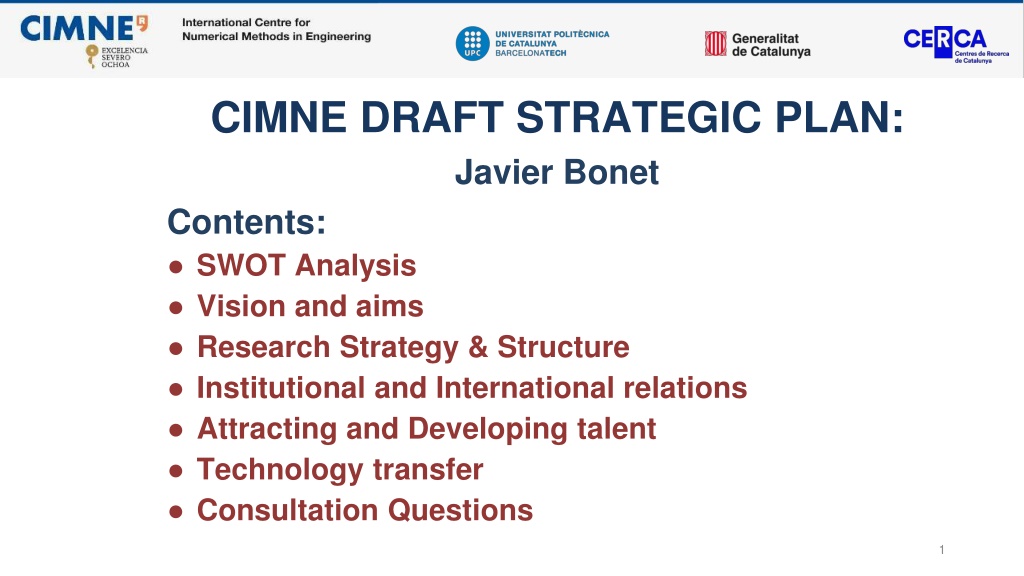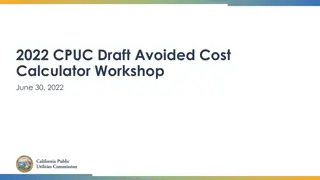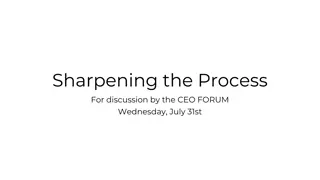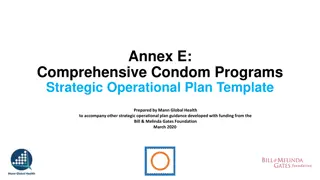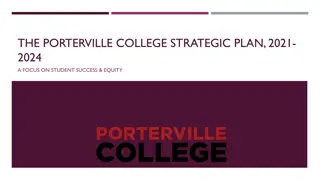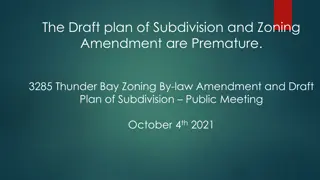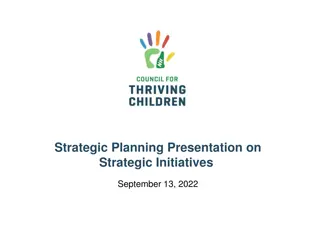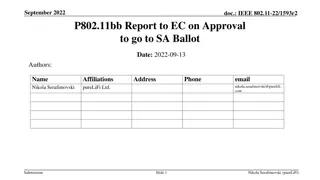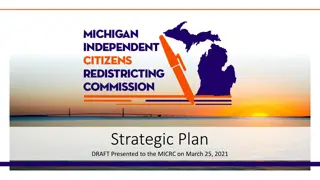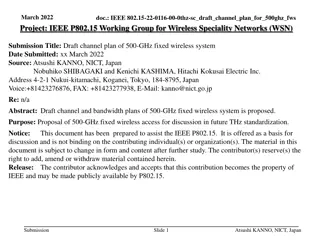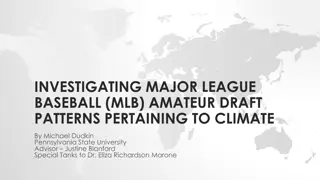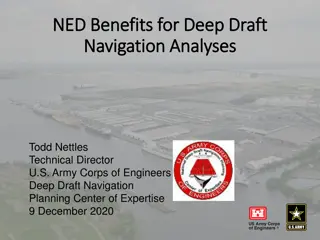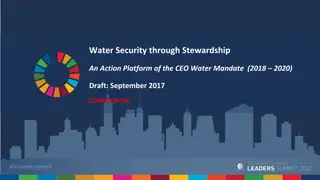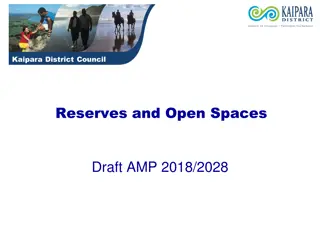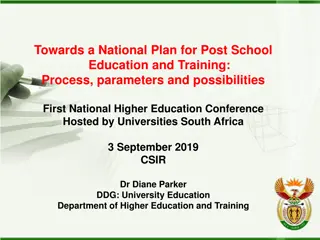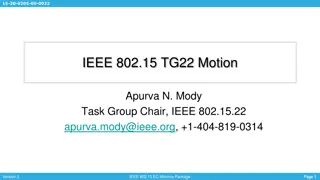CIMNE Draft Strategic Plan Overview
The CIMNE Draft Strategic Plan, authored by Javier Bonet, provides a comprehensive analysis of the institution's current status, strengths, weaknesses, opportunities, and threats. It outlines key areas such as vision, research strategy, talent development, technology transfer, and more. The plan aims to enhance CIMNE's international reputation, attract top talent, and capitalize on emerging opportunities.
Uploaded on Feb 25, 2025 | 0 Views
Download Presentation

Please find below an Image/Link to download the presentation.
The content on the website is provided AS IS for your information and personal use only. It may not be sold, licensed, or shared on other websites without obtaining consent from the author.If you encounter any issues during the download, it is possible that the publisher has removed the file from their server.
You are allowed to download the files provided on this website for personal or commercial use, subject to the condition that they are used lawfully. All files are the property of their respective owners.
The content on the website is provided AS IS for your information and personal use only. It may not be sold, licensed, or shared on other websites without obtaining consent from the author.
E N D
Presentation Transcript
CIMNE DRAFT STRATEGIC PLAN: Javier Bonet Contents: SWOT Analysis Vision and aims Research Strategy & Structure Institutional and International relations Attracting and Developing talent Technology transfer Consultation Questions 1
CIMNE Today SWOT Analysis Strengths A strong international reputation The prestige of being a Severo Ochoa Centre A strong team of academics at all levels of career development, A track record of wining competitive funding from national and EU programmes as well as industry; A strong presence in national, European and international learned societies such as SEMNI, ECCOMAS and IACM. As well as the development of a network of some 30 Aulas CIMNE across the world. The development of a series of widely used software packages and tools such as GiD, KRATOS, IBER, among others. A large and strong body of CIMNE alumni across the world and industry A strong track record of knowledge transfer and societal impact achieved through industrial collaboration and many spin-off companies. Well established administration, management and governance 2
CIMNE Today SWOT Analysis Weaknesses A limited amount of core funding in relation to the overall funding of CIMNE, which makes the activities over reliant on success in project funding and makes it difficult to develop a long-term strategy. Lack of diversity in relation to gender, particularly amongst senior academic staff at the Centre. Uneven distribution of research excellence across different groups in CIMNE. Weak levels of collaboration between theoretical groups and those more focused on the applications of NME. A weak talent management strategy and structure capable of attracting and developing leading worldwide researchers. A strong reliance on UPC academics over CIMNE own staff, particularly in relation to senior staff who are close to retirement. 3
CIMNE Today SWOT Analysis Opportunities Leveraging the international prestige of CIMNE to attract the best researchers to the centre. A greater recognition in Catalan and Spanish society of the importance of science and innovation as an economic driver. A generational change in leadership bringing new ideas and practices from other international environments. The recognition that predictive computational modelling is becoming an essential tool in government and industrial decision making. The emergence and development of new topics and trends in NME The financial opportunities through new national and EU funding programmes. Income generation through the sale of successful spin-off companies. 4
CIMNE Today SWOT Analysis Threats Increasing competition for human and financial resources from similar groups nationally (e.g., BSC) and internationally (e.g., ZCCE, The Oden Institute at Texas ). The inability to carry out the generational change successfully, particularly in relation to the new leadership of the centre. Inability to attract sufficient funds from competitive funding. Failure to renew the Severo Ochoa programme in view of the extremely high levels of completion for this award. Failure to renew or grow the core funding from the Catalan Government. Failure to convince long established members of CIMNE of the need to develop and implement a new strategy to secure the future of CIMNE. 5
CIMNE: Future vision and aims A world leading centre of impactful research in computational mechanics and engineering simulation capable of: Developing a world leading programme of scientific research in the next generation computational mechanics technologies to solve current and future societal challenges Attracting and developing world leading talented researchers Attracting and efficiently managing financial resources Enhancing our national and international profile and relationships with institutional partners UPC, CERCA, IACM, ECCOMAS, UNESCO and build new ones Facilitating the transfer of novel technologies into new or existing companies 6
CIMNE Strategic Plan - components Research strategy and structure Institutional and international relations Financial sustainability Attracting and developing talent Technology Transfer CIMNE Tecnologia Strategy 7
Research strategy and structure Summary: Objectives Thematic focus Methodological toolbox Research structure: groups & units Questions 8
Research Strategy and Structure - Objectives: To identify priority research themes according to current and future needs of society To establish key technologies and methodologies in which to develop international competitiveness To consolidate a structure of research groups and innovation units that are aligned to our themes and technologies and have critical mass to be impactful and financially sustainable To establish clear expectations and targets at individual, group and Centre level 9
CIMNE research themes aligned with stakeholders 17 UN SDGs (ODS in Spanish) 5 EU Missions (Climate, Cancer, Ocean and Waters, Cities, Soils) [ERC Panels PE1-PE6-PE8-PE11-LS1-LS9 ] Spanish government: L neas Estrat gicas Salud (Nuevas T cnicas diagn sticas y terap uticas); Seguridad para la Sociedad (Protecci n ante nuevas amenazas para la seguridad); Mundo digital, Industria, Espacio y Defensa (Modelizaci n y an lisis matem tico y nuevas soluciones matem ticas para ciencia y tecnolog a & Materiales avanzados y nuevas t cnicas de fabricaci n); Clima, energ a y movilidad; Alimentaci n, Bioeconom a, Recursos Naturales y Medio Ambiente Generalitat de Catalunya (Dept. Territori). Eixos transversals. 10
CIMNE Research Themes: Energy and the Environment Transport and Mobility Climate Change Adaptation Industrial Processes Health 11
CIMNE Priority Themes: Adaptation to climate change Transport and mobility Energy and Environment Industrial processes Health Induced hazards assessment, risk of extreme events Coastal/Floods/la ndslides protection Infrastructure assessment and adaptation Transport infrastructure Urban mobility Aerospace and vertical mobility Naval transport Automotive Renewable energy Materials for energy Fusion, Nuclear waste treatment Energy efficiency and distribution Water storage and distribution Air and land contamination Advanced and innovative manufacturing - Digital twins Emerging materials - metamaterials Smart construction Patient-specific approaches Modelling biosystems 12
CIMNE Research Methodologies: Physical and mathematical models Data driven models High performance computing Discretization techniques Novel grid-based approaches Particle and meshfree methods Unfitted methods Error assessment and adaptivity Geometry and simulation representation Constitutive formulations Material models for multiphysics and multiscale phenomena Novel variational formulations Physics- Informed Machine Learning Reduced-Order Modelling Big data management Uncertainty Quantification Domain decomposition and pre- conditioning Emerging architectures (e.g. Quantum computation) New coding paradigms 13
Research structure Revisiting current structure Research groups and Innovation Units as basic elements, with different aims and expected outcomes. Not directly included within Thematic areas To be classified as for Themes and Methodologies 14
Research group requirements Expected accomplishments Significant academic impact in terms of Research outputs in leading journals Citations Participation and organization of congresses Awards Research Income from several of: ERC, EU-Thematic calls, EU-MSC Doctoral Networks, Generacion Conocimiento, Retos, Industry Engagement in societal impact in terms of Innovation, TT, Research valorization and commercialization Dissemination and outreach Composition and focus At least one senior researcher, preferably two or more Critical mass: more than 2 doctors Stable and financially sustainable Strongly aligned with CIMNE priority themes and technologies 15
Innovation unit requirements Expected accomplishments Significant societal impact in terms of Innovation & TT with significant and sustained income Industrial engagement and income Research valorization and commercialization Dissemination and outreach Awards Composition and focus At least one senior researcher or staff scientist (Senior Innovation Officer), preferably two or more Critical mass: more than 3 members Stable and financially sustainable Strongly Aligned with CIMNE priority themes Academic presence through (possibly in collaboration with research groups): Research outputs Contribution to research income 16
Questions Research Strategy: Are the identified priority themes correct? (add, amend, remove) Are the technologies and methodologies correct? (add, amend, remove) Is the differentiation between Research Groups (RG) and innovation units (IU) useful? Should we use a different terminology? Are the definitions of RG/IU, in particular critical mass correct? Are the expectations for RG/IU correct? What are the Key Performance Indicators that should be measured Anything else 17
Institutional Relations & Funding Summary: Objectives Relations with UPC Relations with Generalitat International presence Funding Questions 18
Institutional relations & funding - Objectives: To have a close and mutually supportive relationship with UPC To have a close and supportive relationship with cognate departments of the Generalitat To raise levels of core funding (in kind from UPC and in cash from Generalitat) to ensure financial stability and sustainability To consolidate our international presence and enhance further our profile through leadership and participation in learned societies To consolidate and enhance our congress activities To increase the amount of competitive funding attracted to CIMNE 19
Institutional Relations with UPC (strategy for the coming 5-10 years) Reasons to convince UPC about benefits provided by CIMNE Large scientific production of CIMNE staff and affiliated PDIs adding to UPC reputation Large number of PhDs registered at UPC and financed by CIMNE Access to funds that wouldn t be provided to UPC like SO, or Contracte Programa provided by Departments of Territory and Industry of GENCAT. International recognition of CIMNE as a UPC entity Effective TT through CIMNE Develop Agreement CIMNE-UPC (and eventually GENCAT) defining: In-kind contributions of UPC to CIMNE including affiliated personnel, renting of spaces, access to UPC facilities, etc. Teaching activities of CIMNE staff in UPC Affiliation of CIMNE staff to UPC appearing in all CIMNE publications Formal participation of partially affiliated UPC staff in CIMNE European Projects Engage senior administrative staff through revised Executive Commission 20
Institutional Relations with UPC (Strategy for the coming 5-10 years) Support and encourage UPC staff to affiliate to CIMNE based on: International recognition through profile of CIMNE SO and CERCA recognition International networking Enthusiastic and experienced administrative support Supporting environment for research training and dissemination (caf s de CIMNE, seminars, ) Access to SO, CP funds through thematic priorities Expectations for UPC staff affiliated to CIMNE Income generation and financial accountability Scientific excellence commensurate with CIMNE international profile Alignment to CIMNE priority themes and technologies Contribution to SO and CERCA programmes Contribution to the research environment (caf s de CIMNE, seminars, ) 21
Institutional Relations with GENCAT (Strategy for the coming 5-10 years) Develop Agreement CIMNE-GENCAT To ensure that research themes are aligned with Generalitat priorities To increase core funding up to a 30% of CIMNE total budget To increase contribution from the three GENCAT Departments linked to CIMNE: Territory 2 M Industry 1 M Universities & Research 1 M To dedicate part of core funding to attract international talent as CIMNE Staff To increase the ratio of CIMNE staff vs staff affiliated from UPC To better engage Senior administrative staff through revised Executive Commission 22
Institutional International Relationships Extensive use of CIMNE s Scientific Advisory Council by setting up specific task & finish subgroups To enlarge the number of international networks in which CIMNE is involved (IUTAM, SIAM, ) To set up Joint Labs with different Universities (University of Swansea, Universit degli Studi di Pavia, Politecnico di Milano, TU Braunschweig, Technical University of Athens, ) and to use them as a platform for European Projects, in particular MSC-DN s To enhance activities of CIMNE Classrooms and better exploit network To consolidate our Congress activities and ensure their financial sustainability 23
Actions Related with Funding To set up an Industrial and TT Advisory Council To organize specific sessions with selected IPs related with specific funding opportunities To provide more targeted funding information to IP s To attract staff to CIMNE with strong funding track records and expectations To ensure that research groups have stable tenured leadership (CIMNE staff or UPC affiliated) To distribute CIMNE funds according to transparent and agreed methodologies To assist and improve the monitoring of income and deployment of resources by groups/units, ensuring their financial health and sustainability 24
Questions Institutional Relations Have we correctly identified UPC/CIMNE relationship priorities? Comments in relation to UPC staff affiliated to CIMNE Are the expectations in relation to GENCAT reasonable? Comments in relation to attracting more external competitive funding Comments in relation to enhancing international relationships What KPI s should we establish and target? Anything else 25
ATTRACTING & DEVELOPING TALENT Research Careers at CIMNE Summary: Objectives Attracting talent Improving gender balance Enhancing training for researchers Developing career pathways Questions 26
Attracting and developing talent - Objectives: To establish CIMNE as a leading destination of choice for senior and junior researchers in the field of numerical methods and computational mechanics To improve the gender balance of researcher community To develop an comprehensive programme of research training To establish clear and comprehensive career pathways for academic research and innovation 27
ATTRACTING TALENT - Actions New landing page in CIMNE s web site where we explain: Why is working in CIMNE attractive (what we offer apart from the position itself) https://www.cimne.com/m3382/join-us/why-work-at-cimne Clear explanation of open positions https://www.cimne.com/m3455/join-us/job-offers Clear view of existing funding grants and scholarships for joining CIMNE https://www.cimne.com/m3449/join-us/career-opportunities Increase effort when disseminating open positions, using social media (LinkedIn, Twitter), CIMNE s web site, Euraxess and Research Gate. 28
ATTRACTING TALENT Special actions to attract Senior Talent: CIMNE s Managing Board should study in which areas CIMNE needs to incorporate senior leadership and approach candidates directly Foster the engagement of senior leaders, specially through ICREA. There should be one CIMNE applicant in each ICREA (Engineering) call Special actions to attract Junior Talent: New actions: open on-line sessions to explain to future PhD why joining CIMNE would make the difference: explain our research challenges. Sessions to be organised before deadlines for funded fellowships calls. The recording of these sessions could be uploaded in the landing page for Join us at CIMNE s web site. Preparing a roll-up for dissemination of junior (or even senior positions) in CIMNE conferences. 29
WELCOMING NEW RESEARCHERS Our Welcome Strategy needs to be improved. New special actions to welcoming new researchers: Initiate a social programme that could include: sports, mindfulness, off- site activities, among others. To be further discussed. Start a mentoring programme, where PhD students of last year accompany new students. We should open an internal call to select the mentors and decide how we remunerate them. Support arrivals of new researchers: picking them at the airport, help with accommodation, guided tours of the campus and CIMNE s premises, assistance with legal/administrative procedures (NIE, registration, banks, etc.), among others. 30
IMPROVING GENDER BALANCE Special actions to attract women researchers: Specially inviting women researchers to participate in CIMNE s open calls Implement a new procedure involving HR dept in which all spontaneous candidates that arrive at CIMNE s mailboxes will be answered and advised to visit the section Join us regularly. Besides, all female CV will be stored in a special file for further use. Email text to be revised. To be further discussed. Aim to have female applicants for every call. Increase work balance measures: up to 2 WFH days, giving more flexibility to parents with children under a given age, etc. To be further discussed. 31
TRAINING FOR RESEARCHERS We have designed a Training Programme for CIMNE researchers, from PhD to Full Research Professors: PhD Students Post Doc Assistant Professors Associate Professors Full Research Professors Innovation Officers Project planning, time management, budget control and organisation of researchers Intellectual property Employability skills (Writing CVs and job applications, Successful Interviews and Professional development planning) Impactful academic writing X X X X X X X X X X X X X Publishing, bibliometrics and peer review X X X Three Minute Thesis (3MT) competition Powerful presentations and vocal coaching: Improve personal Impact and presentation skills Research Integrity X X X X X X X X X X X X Leadership X X X X Entrepreneurship X X X X Environment and Prevention of Labour Risks X X X X X X Information Security Awareness / Data Protection X X X X X X 32 Ethics X X X X X X
PROFESSIONAL CAREER: ACADEMIC PATH Distinguished Research Professor Honorary It may be remunerated (under a contract Investigador Distingit ) if a funded project is granted to the Professor New figure Full Research Professor No subcategories TENURE POSITION Associate Research Professor ASSOC1 ASSOC2 ASSOC3 TENURE POSITION Assistant Research Professor ASSIS1 ASSIS2 ASSIS3 33
PROFESSIONAL CAREER: ACADEMIC PATH PDOC1 PDOC2 PDOC3 Post Doc PHD1 PHD2 PHD3 PhD Student Master Student No sub-categories - Tenure positions will only be available for Associate and Full Research Professors - Tenure Positions will be supported by core funding, non tenured positions subject to project funding - Representatives of CIMNE SAC will be involved in the promotion of tenure research positions - Re-consider/ adapt criteria for the scales in the Academic Path - Promotions and recruitment panels to have gender diversity 34
PROFESSIONAL CAREER: NEW INNOVATION PATH - Tenure positions will only be available for Senior Innovation Officers - Tenure Positions will be supported by core funding - Establish criteria to be applied for the scales for the Innovation Path. - Same promotions panel as per academic path, which should include Senior Innovation Officer, SAC and gender diversity Senior Innovation Officers Includes former: RENG1+ RENG1 STAFFSC1 TENURE POSITION Includes former: RENG2 RENG3 RENG4 STAFFSC2 STAFFSC3 Innovation Officers Junior Innovation Officers Includes former: RENG5 RENG6 35
Questions Attracting & Developing Talent: Are the proposed actions to attract talent correct? Are the actions to promote gender balance right and sufficient? Is the training matrix appropriate? Do you have any comments about the Academic career pathway? Comments about promotions panel Comments about the new Distinguished Professor role and/or terminology? Comments about the Innovation career pathway. Is the terminology correct? What Key Performance Indicators should we measure and target? Anything else? 36
Technology Transfer Strategy Objectives Technology Transfer model Activities to support Technology Transfer process in CIMNE. Technology Transfer policy and governance Activities to increase CIMNE s understanding of the market Questions 37
Technology Transfer - Objectives: To ensure that CIMNE maximizes the impact of our research in society To promote all forms of technology based innovation To have robust mechanisms for making decisions to protect and exploit intellectual property To ensure that CIMNE is well informed of stakeholder and market needs in relation to simulation technologies To obtain appropriate financial returns from exploitation activities so that that they can be reinvested into research and innovation To disseminate effectively our achievements beyond academic communities 38
CIMNE Science based innovation model Ideas & needs. Challenges Public funding for research and education Taxes and financial returns. Jobs creation. Impact in the society. Universities & Spin-off companies & Start-up ecosystem Research centres CERCA Publications, dissemination of knowledge. Training and education. Trained professionals. CIMNE Industrial companies Basic and Applied Research Incomes from product and services commercialization. Market of goods and services Science based products Knowledge & Publications Science based Spin-off companies offering products and services to market needs based on science. Science based innovation Technological Development Public fundings & industrial support for development Scientifical based Incubators Technological Centres Public support for innovation. Venture capital and corporate innovation funds CIMNE Technology TECNIO Corporate innovation departments CIMNE Technology stock & Prototypes Results applied to solve industrial needs. Prototypes. Applied science based know-how. 39
Technology Transfer alternatives - No IP transfer - Objectives achievement-based Incomes - Short term returns - No additional investment needed - No financial risks - Low margin financial returns (1)Services Training, consultancy services and personalized developments Pathways to transfer research and development results to the market - IP transfer to companies - Usually should be combined with (1) - Royalties based incomes. Business risk. - Medium term returns - Medium size investments - Low financial risk - High margin and Mid term returns generation (2) Licensing Technology transfer agreements - IP transfer to companies - Usually should be combined with (1) + (2) - Incomes trough royalties and benefits - Returns in mid and long term - Medium / high investments are needed - Higher financial risk - Very high margin and financial returns (3) Spin-off Technology based spin-off companies 40
Activities to support Technology Transfer in CIMNE (1) CIMNE s Research and Development activities Impact into the society measurement. Business development & promotion Contract and project management Quality and customers follow up (6) Services (2) Technological surveillance and business opportunities detection. (3) Strategical analysis of technologies. Market assessment. Value proposition definition. (9) Impact in the society traceability and evaluation. Customers relationship management. Development of new opportunities License agreement negotiations Promotion & licensees' detection Agreement & customer follow up. (7) Licenses (5) Communication and dissemination activities (4) Selection of tech transfer alternatives and marketing plan With the support of CIMNE Technology Business plan validation. Company creation. Support to the company growth. Exit negotiations Partners and investment development (8) Spin-off 41
Technology Transfer policy in CIMNE - IP and patents property - Exploitation rights - Economical returns distribution - Consideration of the CIMNE and UPC agreement - Rights over the IP and Patents of the research staff - Procedures to license technology to companies - Procedures to create spin-off companies - Procedures to present patents - Procedures to provide services to spin-off companies Develop Document with the Technology Transfer policy of CIMNE 42
Technology Transfer Committee Formed by: - Director of CIMNE - Administrative Director of CIMNE - Technology Transfer responsible - External Technology Transfer expert Functions: - Define the IP and exploitation strategy of CIMNE - Support strategical decision over technologies to be exploited - Make decision on IP protection needs and costs - Define and control Technology Transfer agreements - Define and control of services agreements between CIMNE and Spin-off companies - Control de evolution of the Technology Transfer activities. 43
Industrial & Technology Transfer advisory board Formed by: - Technology Transfer responsible - External Technology Transfer expert - External industrial senior advisors from different industries and fields. (public & private representing different target institutions related to CIMNE knowledge fields) Functions: - Advise on industrial relevance of CIMNE research and future industrial technology needs - Advise on the market evolution and opportunities for CIMNE Technologies in the market - Support the validation of business opportunities for proposed CIMNE Technologies - Support business development processes and dissemination activities - Detect new challenges from CIMNE s potential industrial market - Support the integration of CIMNE into the industrial ecosystem at national and international levels 44
Activities to increase CIMNEs understanding of the market Activities involving: - CIMNE Management - Technology Transfer responsible - External industrial senior advisors from different industries and public bodies. - Key Research staff from CIMNE Implement Road Mapping Exercises with the objective of: - - - - Match existing CIMNE s technologies with target market needs and challenges Increase the knowledge and understanding in CIMNE of the target industrial market challenges Focus research and development strategy of CIMNE into future needs of the target markets Spread the information and understanding of market needs inside CIMNE s researcher's staff 45
Questions - - - - Is the CIMNE model of TT (Cycle of Ideas) still valid and appropriate? Have we identified the correct impact pathways and TT activities? Comments on the composition and function of the TT Panel Comments on the needs, composition and function of the Industrial and TT Advisory Board Comments on Road Mapping exercises and potential participants What KPI s should we measure and target in relation to TT? Anything else? - - - 46
Strategic Plan questions Research strategy | Institutional relations & funding | Talent | Tech transfer http://bit.ly/3OHZBAc 47
